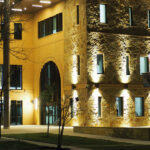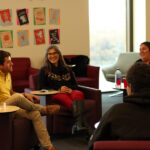The symposium, which has received support and funding from University administration, was initially brought up because of something, committee members say, was lacking on Texas A&M-San Antonio’s start-up campus.
“I realized that there was nowhere for our students to showcase their work outside of the classroom,” said assistant English Professor Ann Bliss, one of four symposium committee members.
Bliss sits on the committee with assistant Professors Vicky Elias and Amy Porter and Ed Westermann, visiting assistant history Professor.
“Many universities hold undergraduate and graduate conferences usually on a departmental level,” Bliss said. “I wanted to start a similar annual event here and talked to my colleagues who were very enthusiastic,” she said, adding that Bill Bush, head of School of Arts and Sciences, was receptive to the idea.
She said after she suggested the symposium idea, she received only enthusiastic responses from all administration and offers to fund the event. “That kind of response made it very easy to plan the event and to get others involved.”
The collaborative process extended into several departments and help was offered from a number of staff members including Jolene DesRoches, counseling and disability services coordinator, who Bliss said “helped us with planning and arranged for the programs to be printed.”
Bush said his role was organizational, including the approval and budgeting process and coordinating details such as printing programs and providing lunch.
“The committee kind of ran the whole program by me and it looked really good,” Bush said.
That initial meeting was almost a year ago.
“I hope it’s the first of many. We’re really excited about it,” adding that the event has been announced at faculty meetings and circulated to faculty via email.
Elias, committee member and assistant professor of arts and sciences, said committee members did not assign students research topics, leaving it open to students.
Presentation guidelines require each student to have an A&M-San Antonio faculty sponsor and submit original research reviewed by symposium committee members.
Describing the submission process, Elias said that “any student could have thrown their hat into the ring. A faculty adviser had to approve and back them up. After that, all topics were reviewed by the committee.”
“We announced the event to all arts and sciences faculty and received submissions from English, history, sociology and psychology.
The University’s first student symposium required many factors to be answered in advance, such as committee roles. Elias said she and the committee agreed that one of their main roles is to give feedback and support to the students.
Participating students, who were unavailable for interviews by deadline, are busy preparing for tomorrow’s symposium.
But symposium committee member spoke on behalf of the event’s importance and future.
Bliss said, “The level of scholarship is very high and I am excited for the students to present their work. We hope to expand the event next year and have submissions from other programs.”
Elias said she has been meeting with three students whose research was accepted once a week.
“This has been a lot of work for them. This level of work is not something that anyone can do quickly and easily,” Elias said. “No matter how intelligent you are, this is something you have to work on for a while.” In some proposals, Elias added, a faculty member probably recommended a postponement.
“We’re a pretty new college and I think it’s really a victory for all of us that now we’ll be able to offer this opportunity, Elias said.
[divide style=”3″]
Schedule
Humanities Panel I
9:00-10:30 am
Room 205
Michael Persyn: “Castro’s Colony: Alsatian and Other Alemannic Settlers, 1842-1870”
Kline Torres: “Birthed into Bondage, Freed by Thievery: Robert Smalls, Black Civil War Hero”
Shaina Gella: “The Long Road to Freedom: Emancipation of Texas Slaves, 1865-1870”
Jena-Lyn Root: Valorizing Indigenous Mexican Identity
[divide]
Sociology Panel
10:45am-12:15pm
Room 205
Teresa Livengood: “Ritual in Military and Police Training”
Marissa Cisneros: “Processed Assimilation: How Assimilation is Associated with Processed food by Mexican Americans”
12:15-1:30 Lunch
[divide]
Psychology Poster Session
12:15-1:30
Room 206
Megan Peña: “Playing Music in the Classroom to help Third Grade Students with ADHD Concentrate”
Jennifer Hambright, James Gomez, and Laura Hernandez: “Alcoholism, Traits, and Family History”
Laura Hernandez, Jennifer Hambright, and James Gomez: “Adderall Use in College Students”
[divide]
Humanities Panel II
1:30-3:00pm
Room 205
Nicholas Valdez: “Eating Lightning and Crapping Thunder”: The Sterilized Monomyth in Rocky”
Mercedes Torrez: “Pin-Ups and World War II: Replacing Masturbation with Inspiration”
Samantha Salazar: “She Sang Dixie”
Teresa Ruiz: “Advocate or Monstrosity”







